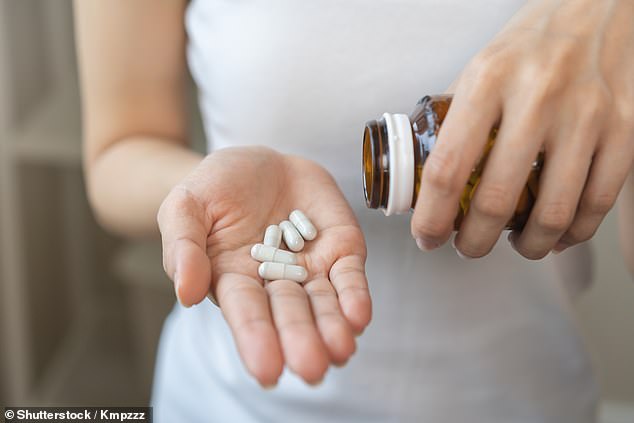Expert warns about common supplements that can give you cancer
A dietitian has revealed the common supplements that could increase the risk of cancer.
Nichole Andrews, an oncology dietitian in Washington state, warned that while common supplements like vitamin C are touted for boosting the immune system, the products are often overdosed.
She said the irony was that “many people will take high doses of supplements to try to reduce their risk of cancer or improve their health.”
However, the ‘more is better’ mentality is ‘wrong’. Ms Andrews explained that the body cannot remove excess vitamins but must instead absorb them through the digestive system and into the bloodstream.
If the body can’t process them fast enough, the supplements can attack healthy cells and stimulate the growth of cancerous tumors.
Ms Andrews said: ‘It will damage your cells to a great extent.’
That’s a concern since more than half of Americans report using at least one dietary supplement.
And experts believe that as many as nine out of ten of these pills are mislabeledof which the actual dosage is unknown.
Nichole Andrews, an oncology dietitian in Washington state, said taking certain supplements such as vitamin C in high doses could increase the risk of cancer

Dietary supplements are not strictly regulated by authorities such as the FDA, so it is difficult to know how much of the Daily Value is actually in one pill (stock image)
In a recent TikTok video, which has been viewed more than 22,000 times, she advises people to focus on getting these nutrients from food and not take too many supplements if they don’t have deficiencies.
Ms Andrews said when excess vitamins flood the bloodstream they form free radicals.
According to the National Cancer Institute, these are unstable molecules that attack DNA and disrupt normal cell function, causing cells to mutate and become cancerous.
A study conducted last year found that when cancer patients and people at risk for the disease took vitamin C and E supplements, new blood vessels formed in lung cancer tumors.
This caused tumors to grow faster and spread to other parts of the body.
Moreover, a study by The Ohio State University found that male smokers who took high doses of vitamins B6 and B12, which are intended to help red blood cell formation, had a fourfold increased risk of lung cancer compared to men who did not take the supplements.
The researchers said at the time: ‘These are doses that can only be obtained by taking high doses of vitamin B supplements, and these supplements are many times the US recommended daily allowance.’
However, studies of these effects have been largely observational, meaning they do not demonstrate a direct cause. Other studies have also shown no link between high-dose supplements, but experts still urge caution.
However, when consumed through food and in normal amounts, nutrients such as vitamin C act as antioxidants, which have been shown to neutralize free radicals.

Citrus foods such as lemons and limes are high in vitamin C, with one orange containing nearly the recommended daily allowance of 65 to 90 milligrams.
Dietary supplements are not strictly regulated by authorities like the FDA, so it is difficult to know how much of the daily value is actually in one pill.
However, Ms Andrews said getting nutrients such as vitamin C and B12 through food does not put you at risk of consuming toxic doses.
She said, “You’re never going to reach that high of an amount with food.”
Citrus foods are high in vitamin C, with one orange containing nearly the recommended daily allowance of 65 to 90 milligrams.
Meanwhile, animal proteins such as red meat, eggs and fish are rich in nutrients such as vitamin B12.
Ms Andrews also warned that unless you are particularly deficient in certain nutrients, you probably don’t need a supplement in the first place.
She said, “Unless you have a prescription from your doctor, food is sufficient.”
Experts also suggest that while nutrients like calcium and fiber have been shown to reduce the risk of breast and colon cancer, it’s best to get them from food rather than supplements.
As with food and drink, the body absorbs supplements through the small intestine, where they go directly to the bloodstream.
